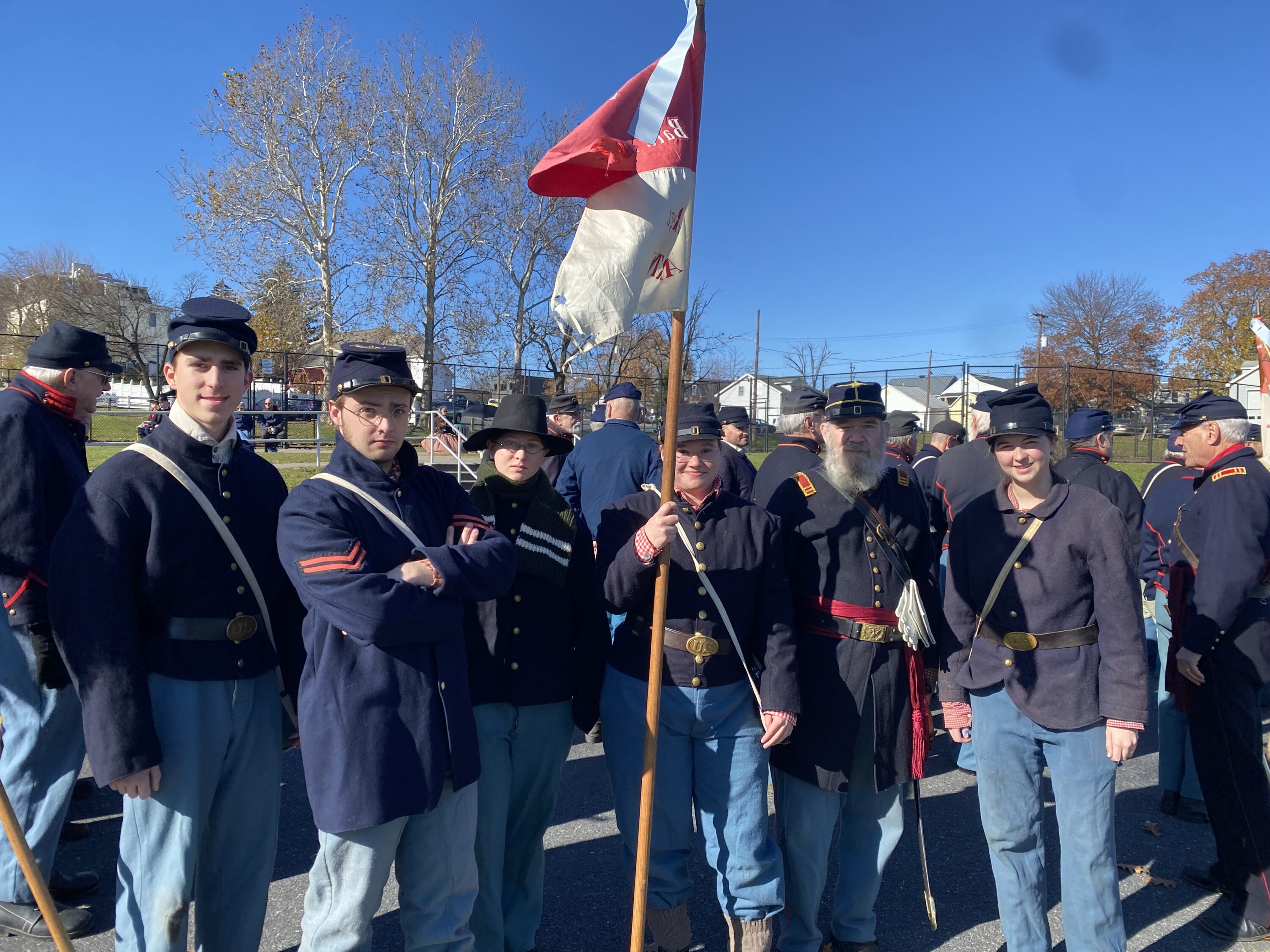By Laurel Bennett, Features Editor
The 26th Pennsylvania College Guard club (26th PCG/PCG) gives members the opportunity to attend Civil War reenactments and living history events around Gettysburg and at National Park sites. The club draws its name from the Pennsylvania College students who served their nation during the American Civil War and put their studies on hold.
Each semester, the 26th PCG attends one to two events that allow members to fully immerse themselves. Last semester, the club spent a weekend at the Cedar Creek Battlefield.
Miriam Glatfelter ’24 serves as the president of PCG this semester.
She explained, “[The 26th PCG portrayed] artillery soldiers in a large re-enactment, then some of our members marched in the Remembrance Day parade and attended a ball in town.”
Brian Short ’24 was the president of the club last semester, and he also thoroughly enjoyed the experience of going to Cedar Creek.
“We were fortunate enough to befriend a member of the local community who was willing to teach us artillery drill and use his piece for the event. We had about sixteen members attend and everyone enjoyed the event,” Short said. “The club got the opportunity to camp for the weekend as well as participate in the military scenarios through the event. We had several members who were new to the reenacting hobby, and it was fulfilling to give them this experience.”
Teaching Assistant for the French Department Jules Inizan went to Cedar Creek with the club last semester. He is experiencing the United States for the first time and previously had no military experience, but he felt at home with the opportunity nonetheless.
He emphasized the seriousness of the reenactment, as they were working with black powder and very heavy materials. The drills they were given by experienced reenactors allowed them to remain safe.
Inizan gave more insight into the experience: “Fighting is of course very thrilling but it’s not all. Participating in a reenactment means living like an 1860s soldier for a few days without any technology, where the only source of heat is the campfire. Rain or not, you need a fire to cook with and to warm yourself as the temperature can sometimes be very low.”
Going to the battlefield allowed Inizan and other members of the club to make new friends. Inizan explained that many musicians playing guitars, violins and banjos would perform at night around the fire, which provided an authentic experience. Participants would sing songs from the Civil War such as “Marching Through Georgia.”
The Cedar Creek reenactment, as well as the PCG as a whole, strives for inclusivity. Many different ages attended the reenactment.
“The PCG club is very open and many girls are part of it,” Inizan stated. “We managed to create a feminine squad for an entire cannon, which was fantastic even though we are always mixed.”
Another central component of the club’s accessibility is the ease of getting proper attire.
Glatfelter noted, “The 26th PCG enables students to attend events successfully by loaning all necessary uniforms, gear and civilian clothing to our members free of charge.”
Currently, the club is hard at work planning for their events this semester. Short elaborated, “We are planning to do a mini living history event at Harper’s Ferry National Historic Park with their staff in the spring, as well as a few campouts this semester to brush up on military drill.”
This semester, the 26th PCG is also focusing on the Civil War Dance tradition centered around 1860s women’s clothing, which is a strong passion for Glatfelter, both academically and recreationally.
“This year, to accommodate the club’s newly revived Civil War Dance tradition, I am working with my fellow officers to revitalize the club’s civilian clothing collection,” Glatfelter explained. “A couple of us have even taken the initiative to learn historical sewing and garment construction techniques in hopes of making highly accurate and cost-effective garments for our civilian closet.”
Glatfelter also shared how the club’s YouTube channel has also helped to support these passions.
“The club has also given me an avenue to share my prior knowledge of 1860s women’s clothing through our new 26th PCG YouTube channel,” Glatfelter said. “It has been so rewarding to uncover and explain the true practicality and comfort of each layer of an 1860s woman’s outfit.”
Short explained how the 26th PCG has given wonderful opportunities to members, even if they were previously unfamiliar with reenacting.
“My favorite thing about the PCG is that we strive to be a bridge connecting those who already participate actively in the reenacting hobby and those who want to give it a try,” Short said. “I would recommend any student who is remotely interested in the hobby to give it a try.”
Brandon Fey ’27 explained how he has benefited by being a member of this club: “When I came to Gettysburg College, I was new to Civil War reenacting. The PCG has allowed me to connect with the history of the school in a meaningful, hands-on way.”
For Glatfelter, joining the 26th PCG has been the most impactful way for her to learn about the Civil War era on campus.
“Through living history events and re-enactments, you come into direct contact with the sounds, smells, tastes, and material culture of the Civil War Era,” Glatfelter noted. “ I have learned so much about the realities of military life for the common Civil War soldier by wearing all of the different uniform pieces and learning about their functionality, training to become proficient in artillery and infantry drill, and spending nights singing and eating hardtack around a fire under the stars.”
Every Wednesday, the 26th PCG holds its meetings in Weidensall 301 from 6 to 7 p.m. to plan and prepare for their events. At the meetings, the club also discusses material culture and everyday life for both civilians and Civil War soldiers.

